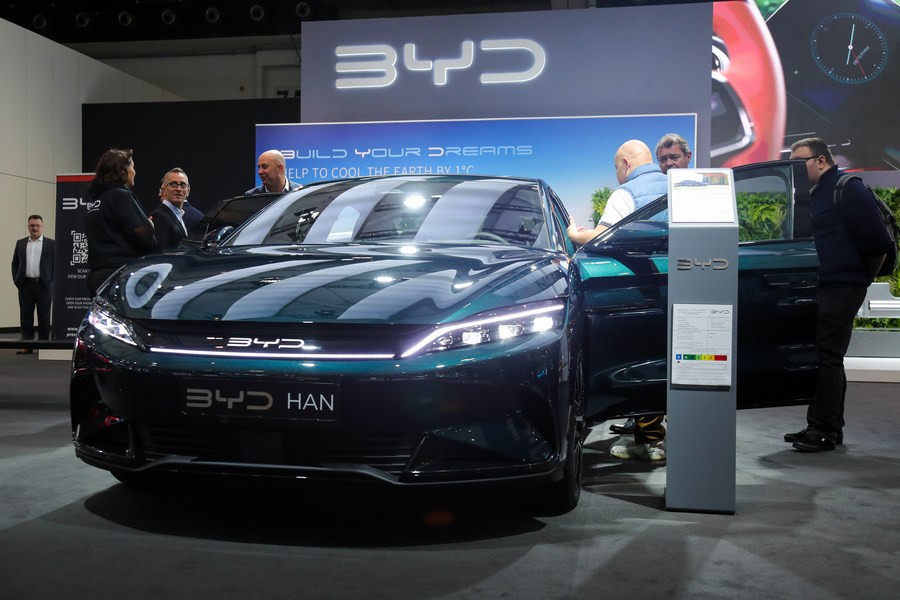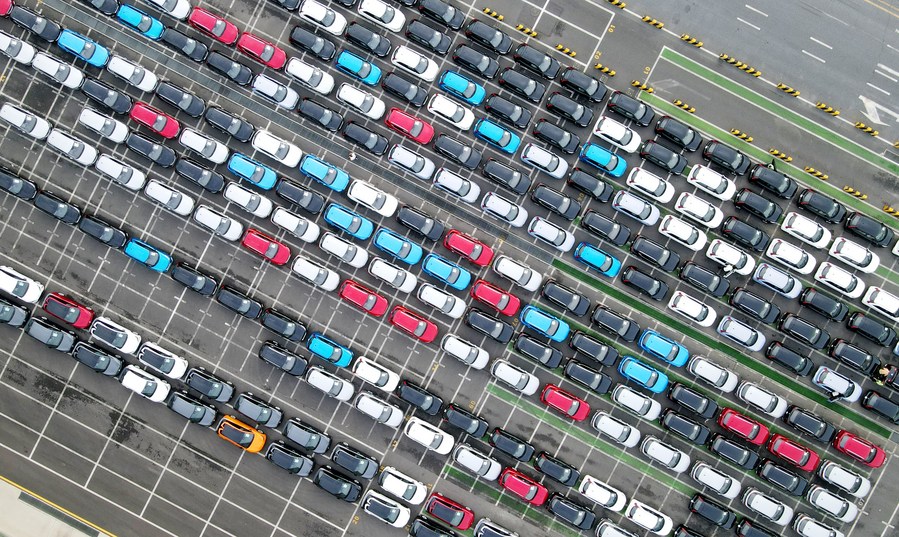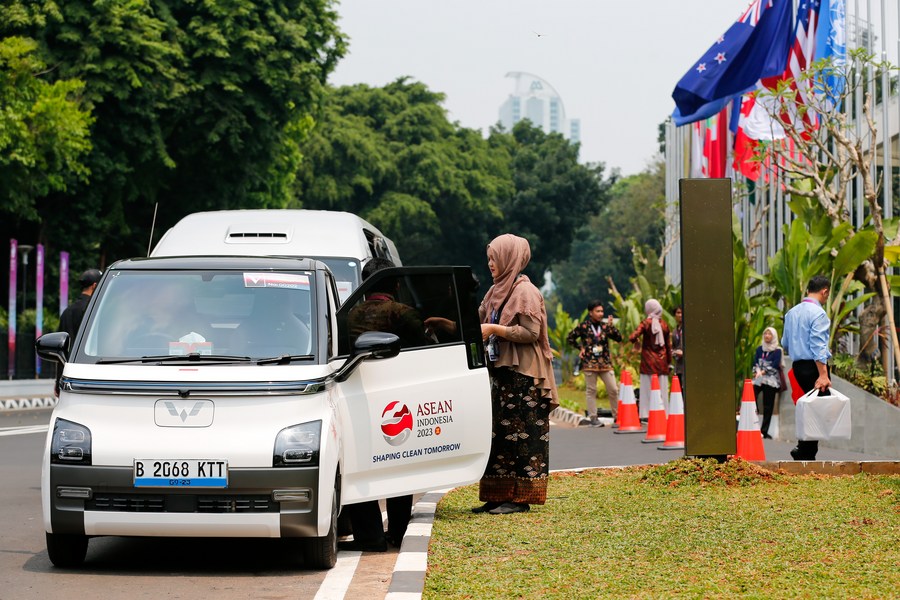*Propelled by a surge in the exports of new energy vehicles, China's auto exports surged to a record high of 4.91 million vehicles in 2023.
*Total auto sales in China topped 30.09 million units in 2023, while output exceeded 30.16 million units.
*China's thriving auto exports is backed by its vast and burgeoning domestic market, the government's push for low-carbon development, an increasingly modern industrial system, and mature industrial chains.
BEIJING, Jan. 11 (Xinhua) -- China's auto exports surged 57.9 percent year on year to a record high of 4.91 million vehicles in 2023 as the country's automakers expanded their presence overseas, data from the China Association of Automobile Manufacturers (CAAM) showed Thursday.
This figure marks another significant increase after the country exported 3.11 million vehicles in 2022 and 2.02 million in 2021.
The massive growth was propelled by a surge in the exports of new energy vehicles (NEVs), which soared 77.6 percent to more than 1.2 million units last year. Exports of pure electric vehicles expanded by 80.9 percent while that of hybrid ones increased by 47.8 percent year on year.
Total auto sales surged 12 percent year on year to top 30.09 million units in 2023, while output exceeded 30.16 million units, up 11.6 percent compared with the 2022 level, CAAM data revealed.
In 2023, production and sales of NEVs exceeded 9.58 million and 9.49 million units, surging 35.8 percent and 37.9 percent year on year, respectively. The market share of NEVs stood at 31.6 percent.

People look at a BYD Han electric car during a media preview of the 100th Brussels Motor Show in Brussels, Belgium, Jan. 13, 2023. (Xinhua/Zheng Huansong)
GREATER GLOBAL RECOGNITION
"The rapid expansion of China's auto sector is delivering improvement to both performance and quality of its products, which are gradually being recognized and accepted by global consumers," said Shu Jueting, a spokesperson with China's commerce ministry, when commenting on the growth of China's auto exports Thursday.
Western and Southern European and Southeast Asian markets are China's major auto export destinations, particularly Belgium, Spain, the United Kingdom and Thailand, according to Cui Dongshu, secretary general of the China Passenger Car Association.
While export volume rose sharply, the average price of automobiles exported last year also increased to 19,000 U.S. dollars, up from 16,000 dollars in 2021, Cui revealed.
"Made-in-China vehicles have not only expanded their reach, but are also improving in quality and gaining greater market recognition," Cui said.
"Before you had to push consumers to buy Chinese cars because people were not familiar with them, but now there are people coming to ask for such brands," said Richard Van Der Engle, owner of a car dealership that sells MG models of China's SAIC in New Zealand.
"New Zealanders have high expectations in terms of the technology available in their cars," he said.

An aerial drone photo taken on July 9, 2023 shows MG cars produced by Shanghai Automotive Industry Corp (SAIC) to be shipped to Australia at Shanghai Haitong International Automotive Terminal in Waigaoqiao of east China's Shanghai. (Xinhua/Fang Zhe)
AUTO MANUFACTURING STRENGTH
China's BYD, which overtook Tesla last quarter as the world's leading seller of pure electric vehicles, saw its exports grow by about 334 percent to over 240,000 units in 2023. The company has sold its products to more than 70 countries and regions on six continents.
Foreign automakers in China are also increasing exports to the global market. Ford China announced in December 2023 that it had shipped over 100,000 vehicles manufactured in China overseas, recording a historic high.
China's thriving auto exports, especially NEV sales in overseas markets, is backed by its vast and burgeoning domestic market, the government's push for low-carbon development, an increasingly modern industrial system, and mature industrial chains.
Shenzhen-based BYD has benefited from technical advancement in this southern tech hub, which boasts a variety of manufacturers producing products ranging from battery packs to charging piles, as well as internet and artificial intelligence companies that are making inroads into the intelligent driving sector.
In the Yangtze River Delta, a major automobile production base in China, an NEV rolls off the production lines every 10 seconds. With chips and software sourced from Shanghai, batteries produced in Jiangsu, and die-casting machines from Zhejiang, an NEV factory in the delta region can acquire all necessary auto parts within a four-hour drive.
"After a long period of 'accumulation,' auto exports in China have entered a stage of explosive growth," said Cui Dongshu, who believes that there is huge development scope for NEVs and domestic brands.

A Wuling Air electric vehicle is seen outside the venue of the 43rd Association of Southeast Asian Nations (ASEAN) Summit in Jakarta, Indonesia, Sept. 7, 2023. (Xinhua/Wang Yiliang)
UPBEAT PROSPECTS AHEAD
Looking ahead, Chen Shihua, deputy secretary-general of the CAAM, said that with the overall economy continuing to recover, China's auto market is likely to maintain sound momentum this year.
The CAAM said it expects China's NEV sales to reach 11.5 million units in 2024, while total auto exports are tipped to hit 5.5 million units.
"The year 2024 could be a crucial year for China's NEV industry in terms of enlarging its presence in the global arena and being a driving force for economic and social development," said Zhang Yongwei, vice president of electric vehicle industry think tank China EV100.
The stronger global presence of Chinese automobiles will change the landscape of the world's auto industry, according to Zhang, who predicted that China's auto exports, combined with vehicles produced in overseas branches of Chinese companies, will top 10 million in 2030, of which 50 percent will be NEVs.
(Video reporters: Ding Ting, Zhou Rui; Video editors: Zhang Yueyuan, Zhu Jianhui, Zheng Xin, Hong Ling)




 A single purchase
A single purchase









